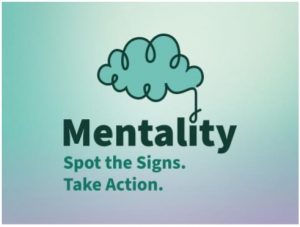Peter Larkum, Mentality founder and mental health expert, on the challenge of seeing those who need help
Mental health and wellness continues to gain in importance as the COVID-19 pandemic brings with it new forms of stress and emotional strain that can cause issues for even the strongest individual and family. As part of SVG Europe’s commitment to mental health we want to introduce our members and sponsors to resources and experts who can make a difference. The following Q&A session between SVG’s Ken Kerschbaumer and Peter Larkum, UK-based mental heath first aid instructor who runs Mentality, lays out his vision for Mentality and mental health.

Peter Larkum, Mentality
SVG: I think all of us in our professional lives have either thought ‘what’s up with him/her’ but then never really act on it, often because we don’t know how to act on it or fear of being seen as prying, etc. How does your programme help someone understand how to navigate those type of situations?
Larkum: Confidence and care are key, as often the hardest step is the first one. I help people gain the confidence to take that first step and to reach out if they feel people are struggling.
And it’s not just that. I also help people have the confidence to open up if they are struggling. This is about battling the stigmas and the discrimination that often surround the conversation of mental health.
When we understand that mental health is impacting on all of us, all the time, it’s then about viewing the conversation as ‘normal’, and also understanding that we’re only asking because we care.
The COVID pandemic has clearly exacerbated mental health issues and wellness. How can an organisation properly begin the journey of helping address those issues in an effective way?
 At the risk of coining a phrase, organisations need to see this as a holistic approach, ‘from the cleaner to the CEO’. Once everyone in an organisation feels supported, and the conversation about mental health is acceptable, more people will be able to access the help and support available as soon as possible.
At the risk of coining a phrase, organisations need to see this as a holistic approach, ‘from the cleaner to the CEO’. Once everyone in an organisation feels supported, and the conversation about mental health is acceptable, more people will be able to access the help and support available as soon as possible.
We need to move away from the conversation of mental health automatically incorporating mental health illnesses. Mental health is much more about whether we are having more good days or bad, and we can all understand that context of the conversation.
There are a number of programmes offered by Mentality. Can you briefly describe the ones that you see as most suited for someone who wants to better understand how to support a colleague?
All my training is now available online and can be accessed from around the world as long as you have an internet connection.
Mentality is the first step, a one-hour base-knowledge training course. This allows everyone to use the same language, like good days and bad days, while also helping people spot the signs of poor mental health and take action.
Step two is MHFA Awareness and that is a four-hour awareness course where we begin to understand when mental health becomes mental health illnesses, and a basic knowledge of mental health illnesses.
The third step is then to become a Mental Health First Aider. This is currently a mix of self-learning and four three-hour online live training sessions.
Which courses are best suited for someone who may be tasked in an organisation to be ‘the’ expert on mental health support?
In that case they should take a look at the full MHFAider course as it has the most in-depth training. Having had psychologists and counsellors on my courses, they have always been encouraged by the depth of knowledge and experience given.
Concern of time commitment for something like this is often the biggest excuse to not getting started in understanding mental health support. What are some of the shortest courses you offer and what makes them effective?
Mentality is the easiest win as it is just one hour and even then, it is split into three 20-minute sections. You can log in and log out and complete this at your own pace. It is effective because of its accessibility and at the end of each 20-minute module there are clarifying questions to ensure the learning process is being achieved.
Also, as a certified course, the individual or the company can track who has completed the course.
Alternatively, the MHFA Awareness course is a four-hour commitment, usually beginning at 09:00 and ending around 13:00. The effectiveness of this Awareness course is the basic knowledge about the seven core elements of mental health illnesses. Those are anxiety, depression, schizophrenia, bi-polar disorder, self-harm, eating disorders and suicide.
The course also helps people understand when bad days become mental health illnesses.
If you want to find out more about Larkum and the mental health training he offers, including Mentality, check him out here: www.peterlarkum.com. Or for a call back visit www.peterlarkum.com/contact

